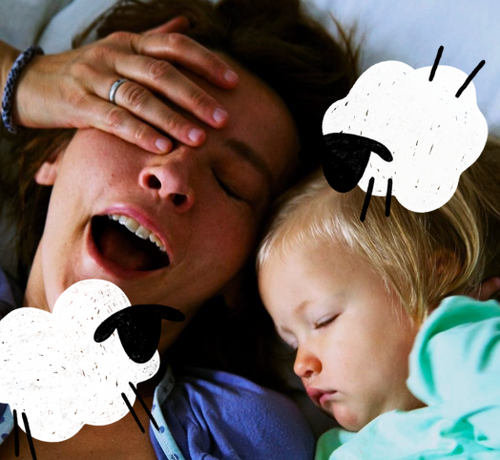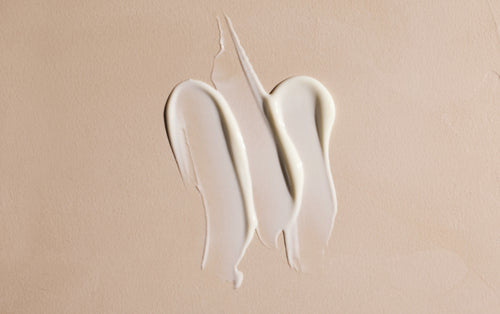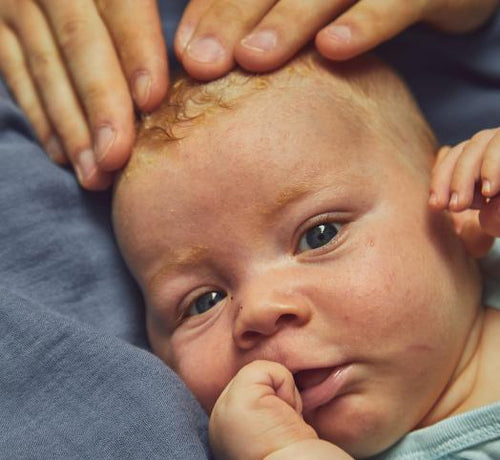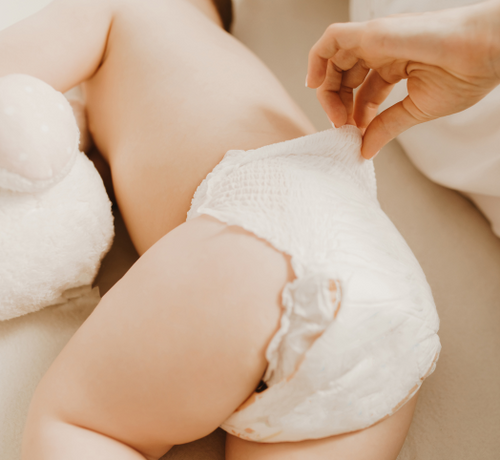Why is Baby restless when he sleeps? Is it normal for him to sleep a lot? When will he sleep through the night? What’s the right time for bed? How and when can you start a sleeping routine? How long should a 3-month-old sleep? And a toddler? What are his sleeping schedules? Parents ask themselves so many questions! We will answer them with the help of Emmanuelle Rigeade, childcare nurse.
4 more questions on babies’ sleep
Why doesn’t my baby sleep through the nights anymore?
Hooray! Your baby has been sleeping through the night for 2 months, so you expect to get some rest now... BUT recently, your baby has started to wake up again at night and you don't know why. Rest assured, these flashbacks are normal and can happen during growth spurts for example (in the first weeks, at 3 months or 6 months old) or if your baby sees his bearings turned upside down, during a trip or in the summer for instance. From 8 months, he can also experience separation anxiety.
What is separation anxiety?
This stage is perfectly normal for a baby and happens around 8 months of age. During this period, your little one needs to be reassured, at different times, especially at night, and calls for his parents for comfort.
What is sleep debt?
Just like adults (or young parents!), babies can suffer from lack of rest that may build up over days or even weeks. If this is the case, you will notice that your child will have more and more difficulty falling asleep: it may seem contradictory, but the more a child is tired… the more difficult it will be for him to sleep. What should you do in this case? Set up a bedtime routine with regular schedules to help your baby find or recover his bearings and, if he's still too young for that, remember to look out for signs of tiredness.
Should you wake up your baby if you find that his nap is getting too long?
You may wonder if babies are less likely to sleep at night when they have overslept during the day. Should you wake him up? According to Emmanuelle Rigeade, "Depriving a child of sleep during the day so that he sleeps better at night isn’t recommended, because on the contrary, a child who is too tired will find it more difficult to sleep at night. It’s only after 3 years old that oversleeping during a nap can affect bedtime."
Now you have all the expertise you need to better understand your child's sleep, from birth until his first year. Managing your baby’s sleep is not easy but trust yourself and you’ll get there!
Calm or restless sleep, paradoxical (or “REM”) sleep… Newborns and babies have different sleep cycles.
Obviously, your little one's sleep cycle and schedule will change with age.
Newborn sleep cycles
A newborn’s sleep lasts 50 minutes and is divided into 3 periods:
-
Falling asleep
-
Restless sleep
-
Calm sleep
If you find that your baby moves a lot during his sleep… this is normal! The restless sleep phase makes up most of this cycle (between 50 and 60%). This is the time he moves, sucks his thumb or pacifier or even growls while he’s asleep. This stops around 2-3 months of age.
Getting your baby to sleep
Experts all agree on this: they recommend that newborns sleep on their back for the first few months (this position reduces the risk of sudden infant death syndrome by 50%) - even though you might feel that your baby is more comfortable on his stomach when he’s in your arms. From 6 months old, he’ll be able to turn over on his own and you might find him lying on his stomach even if you left him on his back. Don't worry, when babies start doing this on their own, it’s also the time when this position becomes less risky.
What mattress is best for a toddler?
Pick a firm mattress (their firmness differs from adult mattresses) that fits the exact dimensions of the bed, and don’t forget the draw sheet (very useful in case of diaper leaks).
Can he sleep with a stuffed animal or a thin blanket...?
All you will need (besides pyjamas and a bodysuit) is a sleeping bag. That's it! No stuffed animals, pillows, duvets because your baby may put them on his face while he sleeps and will not be able to remove them on his own - especially in the first few weeks.
Are babies afraid of the dark?
No! This fear only occurs around the age of 2, when your little one gradually becomes more aware of separating from you, and when his imagination grows etc. That's why you can leave your little one in a dark room without hesitation.
How much sleep does a baby need in his first year?
As you can imagine, during his first year, a baby’s sleep needs will change considerably. He will gradually spend more time awake and the difference between day and night will become more obvious.
How much do newborns sleep?
Newborns sleep between 14 to 18 hours a day (No, not in a row unfortunately! No rest for the parents who may ALSO want to recover…) with sleep cycles that can vary between 30 minutes and 2 hours, or even more for some infants. Newborns make no difference between day and night and can even sleep more during the day. By the way, did you know that habits also vary in babies? Some are heavy sleepers, and some aren’t!
Ever heard of the "The night of Java"? This is the second night after giving birth. After the first night that’s usually calm, your newborn may be particularly restless and cry heavily for a cuddle, for your breast or a bottle.
How much does a baby sleep between 1 and 3 months old?
You may notice that your baby now stays awake longer: from 2 to 3 hours in a row. Not to mention that his biological clock starts to adjust to 24 hours.
What sleep pattern does a baby follow between 4 and 12 months?
From now on, your baby will sleep between 12 and 15 hours a day. Little by little you will get to know his sleep patterns and be able to anticipate when he needs to sleep: on top of his night sleep, your baby will need 3 naps until he is 6 months old (one in the morning, one in the afternoon and one at the end of the day), then 2 naps (one in the morning and one in the afternoon) in the following months. When he reaches his 4th month, he will also be able to fall asleep or go back to sleep alone. Of course, this doesn’t mean that from 4 months, your toddler will sleep soundly without waking you up at night (too good to be true at this stage!).
Does a toddler make the difference between day and night?
As you probably know, newborns don’t make the difference between day and night when they’re born. At this point, their biological clock (that enables to adjust the times spent awake and asleep) isn’t synchronized yet. Around 8 to 10 weeks though, a baby can distinguish day from night. Around 5 to 6 months, you will be able to start a sleeping routine to ease his falling asleep stage. Repeating the same gestures every night or before going to bed will help your baby understand that he will soon be sleeping.
At what age does a baby sleep through the night?
It’s THE question on every parent's mind! A baby's 3rd month is often a long-awaited milestone for sleep-deprived parents. This is because at this age, a baby generally weighs or exceeds 5kg – enough to keep him waiting between two meals! For the same reason, at this point, some babies also start to sleep more at night than during the day with more spaced bottles. However, this stage is usually too early to start a successful routine (diming the lights, a massage routine, a little hug etc.)
How to help your baby fall asleep
To help your baby fall asleep, starting a sleep routine can help, as Emmanuelle Ringeade explains: "Make sure that your baby’s environment is one that secures and reassures him, at all ages. Make for closeness and holding in the first few months, and then set up routines and a safe environment." And if your baby is still too young to start a routine, comfort him, take him in your arms to help him feel safe.
When does a child start to fall asleep on his own or more independently?
From about 6 months, a child can comfort himself with a cuddly toy and go by the routines that you set for him. Through the repeated attempts to sleep in his bed, and the reassuring presence of his parent, your baby will gradually discover how to fall asleep more autonomously. Slowly, you will be able to move away, with a few turnarounds, depending on your child’s needs (teething, illnesses, when changes occur in his life).
How can you make sure falling-asleep doesn’t last too long?
“Some evenings, putting your little one to bed may last quite some time, especially at certain periods (a recent move, going back to school, if there’s a change in your child's life). But if the foundations are laid, these should only be transitional stages.”
According to Emmanuelle Ringeade, “the evening routine is a set of reassuring moments that last for the entire evening: coming home, quality time, showering, playtime, meals, etc. These act like reassuring landmarks for your child like a run-up for what’s coming up next.
The bedtime routine is linked to bedtime separation. It’s shorter and serves as a transition between the time when you are together and the time when your child goes to sleep in his bed. It includes:
- The time of separation (putting his pyjamas on, changing nappies…)
- Change of atmosphere (closing the blinds, diming the lights, lowering your voice)
- Emotion-filling time (hugs, storytelling, massage...)
- …and then you say goodnight.
This time is quite short, it must be structured so that your child understands its meaning. It’s important that it occurs it at the right time, if possible, just before your child's first signs of tiredness, because these signs mean that falling asleep can take place within the next 15 minutes.
What sleep routine should you set up?
Here’s the secret of an effective sleep routine: make sure you repeat it every day, so your baby finds his cues and associates each moment with the following step. Preparing for a nap will be different from preparing for the night. For bedtime, you can bathe your baby and massage him (remember that it shouldn’t be "too long" as you will need to do it every night), then put him in his pyjamas and sleeping bag. Then, give him a last hug in the dark, in his room.
Can you put your baby to sleep by keeping him in your arms first?
"Of course, it's a very good thing to do”, says Emmanuelle Ringeade “The first months your baby is lost and tries to find what he has known for 9 months: closeness, warmth, movement, being held and being together. He will find it easier to fall asleep in his parents' arms, and that's completely normal."
When should you stop putting your baby to sleep in your arms?
“There’s no real ‘should’ or ‘shouldn’t’ when it comes to parenthood”, according to Emmanuelle Ringeade. You can put your baby to sleep in your arms for as long as it suits you both. If one day this falling asleep means that you must get up several times a night to put your little one back to sleep, and you've had enough, you have every right to do it differently. But as long as it suits you, by all means, enjoy!”
When should you put baby to bed?
Sorry, but there’s no miracle time to put your child to bed so he sleeps through the night. However, from 6 months, in general, putting your baby to bed between 7 pm and 8:30 pm will help him have his bearings and find his rhythm.
How do you know if it’s the right time for sleeping?
If your baby's nap (or bedtime) schedules are not completely set yet, some signs will help you notice the right moment when your baby needs to sleep. Of course, if he gives you a cute yawn, rubs his eyes, or starts crying or moaning, you'll immediately know what to do. On the other hand, you may have noticed situations where your child seems to be in great shape… although it’s really bedtime. Typically, if you notice that he has slightly watery eyes, blinks often, becomes paler, or rubs his nose or ears, it's time to put him to bed!
Good to know: you should try to put your baby to bed within 10 minutes after the first signs of fatigue to help him fall asleep. If he's too upset or if he’s missed his sleep cycle, getting him to bed can become tricky.
How to face evening crying?
It’s evening, your child is clean and fed, you can tell that he’s tired, yet nothing seems to calm him down. This situation, well known and widespread among parents (rest assured) is completely normal: it’s evening crying, also called "evening discharge" because this crying is often stronger when the night sets in. Your child uses crying to express himself and to release what may have happened during the day.
Emmanuelle Ringeade’s advice: "It's important to let your baby’s crying out and not to try to silence them at all costs. Hugs, rocking, carrying your baby should do the job to calm him down. It's also important to take turns between adults because these are particularly trying times. Try to make a soft and calm atmosphere, put some soft music on and rock your baby. Remember to take turns, and don’t hesitate to put him down for a few minutes if it's too hard on you. Get out of the room to take a deep breath, drink a big glass of water to be able to come back and feel more comfortable with the crying."
Should you leave your child to cry?
According to Emmanuelle Rigeade, "It’s not recommended to let your child cry without giving him a reassuring answer, especially over a long or repeated time.”
Why do babies wake up at night?
While it's no surprise that a newborn or infant wakes his parents at night, there may be times when you wonder what the reason really is. Is he hungry? Is he cold? Does he feel lonely? Is he anxious of the separation? Is he afraid of the dark? Does he want to be changed because his diaper is full? So many questions that we sometimes find difficult to answer…
If you're wondering if he's hungry, it’s good to know that before 6 months of age, your baby may wake you up because he needs breast milk or infant formula, depending on what you've chosen to feed him. After 6 months, a child generally no longer needs to drink at night because he can wait longer until the next feed.
If your baby isn't hungry, then why is he crying? If he doesn’t need to be changed, if he’s not teething or if nothing else is bothering him (like an itchy eczema or because it's too hot), your little one may just wake up because he's between two sleep cycles. Some infants manage to fall back to sleep on their own, while others will need the comfort of their parent to do so.
Advice from Emmanuelle Rigeade: "It’s normal that babies wake up at night for the first few months, because their sleep cycles are short, and babies need to eat at night. Later, if this still happens, you should consider your child's sleeping habits, whether he wakes up in the same conditions as when he was put to bed or not, and what means he has, to go back to sleep. Look at what answers are given to him to put him back to sleep at night and see how you can secure him and give him maximum autonomy to go back to sleep."
Good to know: Babies find it easier to fall asleep on their own if they’re used to lying in bed before.
4 more questions on babies’ sleep
Why doesn’t my baby sleep through the nights anymore?
Hooray! Your baby has been sleeping through the night for 2 months, so you expect to get some rest now... BUT recently, your baby has started to wake up again at night and you don't know why. Rest assured, these flashbacks are normal and can happen during growth spurts for example (in the first weeks, at 3 months or 6 months old) or if your baby sees his bearings turned upside down, during a trip or in the summer for instance. From 8 months, he can also experience separation anxiety.
What is separation anxiety?
This stage is perfectly normal for a baby and happens around 8 months of age. During this period, your little one needs to be reassured, at different times, especially at night, and calls for his parents for comfort.
What is sleep debt?
Just like adults (or young parents!), babies can suffer from lack of rest that may build up over days or even weeks. If this is the case, you will notice that your child will have more and more difficulty falling asleep: it may seem contradictory, but the more a child is tired… the more difficult it will be for him to sleep. What should you do in this case? Set up a bedtime routine with regular schedules to help your baby find or recover his bearings and, if he's still too young for that, remember to look out for signs of tiredness.
Should you wake up your baby if you find that his nap is getting too long?
You may wonder if babies are less likely to sleep at night when they have overslept during the day. Should you wake him up? According to Emmanuelle Rigeade, "Depriving a child of sleep during the day so that he sleeps better at night isn’t recommended, because on the contrary, a child who is too tired will find it more difficult to sleep at night. It’s only after 3 years old that oversleeping during a nap can affect bedtime."
Now you have all the expertise you need to better understand your child's sleep, from birth until his first year. Managing your baby’s sleep is not easy but trust yourself and you’ll get there!



















